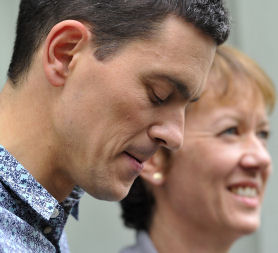David Miliband and echoes of Portillo
As David Miliband bows out of frontline politics, Gaby Hinsliff looks at what is awaiting the former Labour leadership hopeful, and whether his departure is good news for his younger brother.

The trouble with soap operas is that, ultimately, there’s only one place for the storyline to go.
When every fantastical twist and turn is exhausted – even in a plot as rich as Labour’s fraternal power struggle – someone must leave the stage. If they’re lucky, the door stays ajar to a comeback in the Christmas special: if not, an implausible death awaits.
Confirming yesterday he won’t serve in his younger brother’s shadow cabinet, David Miliband initially refused to be written out of the Labour story.
“I’m not dead,” he said, promising to remain an MP – although until recently he promised he’d serve under Ed Miliband. Some will see him as a king over the water, hovering above the fray, so long as he remains at Westminster.
After all, it’s rare for a politician of his ability to let go completely: Alan Milburn quit as health secretary for the sake of his sons but returned to run an election campaign, while both William Hague and Iain Duncan Smith reinvented themselves from political failure.
But the really intriguing parallel is with Michael Portillo, another apparent shoo-in for leader who lost to someone seemingly weaker. His departure from politics afterwards was seen as a kind of midlife crisis, yet examined more closely, it was oddly consistent with the man.
The myth of Portillo as gung-ho assassin always disguised a flakier truth: even while frontrunner for the leadership, he infuriated his closest lieutenants with emotional talk of giving it all up. Ambivalent about power, he lost to someone who wanted it more.
It’s rare for a politician of his ability to let go completely.
David Miliband isn’t as emotional. But the myriad competing explanations for his not challenging Gordon Brown two years ago – too loyal, not ready, Ed dissuaded him, his wife dissuaded him – ultimately add up to the same thing: he didn’t want it enough to risk everything. Ed does. Which is why Ed won, and why David may just be capable of leaving Westminster behind.
Like his close friend James Purnell, who burned his bridges by quitting first Cabinet and then Parliament, David is driven more by ideas than political structures. Like Purnell, he started young, sweating in Downing Street while their peers enjoyed a normal twenty something life: while Ed has taken time out at Harvard, David never stepped off the conveyor belt. He may find it surprisingly liberating to do so now.
Ed Miliband wins the battle of the brothers. Read more in depth coverage on the Labour leadership special report.
Besides, in what circumstances could he return, unless Ed is unseated? If within a year his brother is floundering, David’s comeback looks predatory and destabilising: if Ed were flying, it might look surplus to requirements. Politics is unsentimental, and the waters close surprisingly quickly over heads.
So what might his departure mean for Ed?
The younger brother already seems determined to lead differently than he campaigned: left-wingers should remember that a man capable of running against his sibling is capable of ditching a lot of baggage. Could the surviving Miliband end up embodying the best ideas of both?
Ed is not David: their approach to decision making, the party and to people differs. But freed from the campaign pressure to create artificial divisions with his brother, the similarities in their thinking may emerge.
Perhaps David has set both of them free.
Gaby Hinsliff is former political editor of The Observer.
-
Latest news
-
Taylor Swift’s new break-up album breaks records3m

-
NHS trust fined £200K for failings that led to death of two mental health patients3m

-
Sunak vows to end UK ‘sick note culture’ with benefit reform3m

-
‘Loose talk about using nuclear weapons is irresponsible and unacceptable’, says head of UN’s nuclear watchdog3m

-
‘There wasn’t an Israeli attack on Iran,’ says former adviser to Iran’s nuclear negotiations team7m

-




